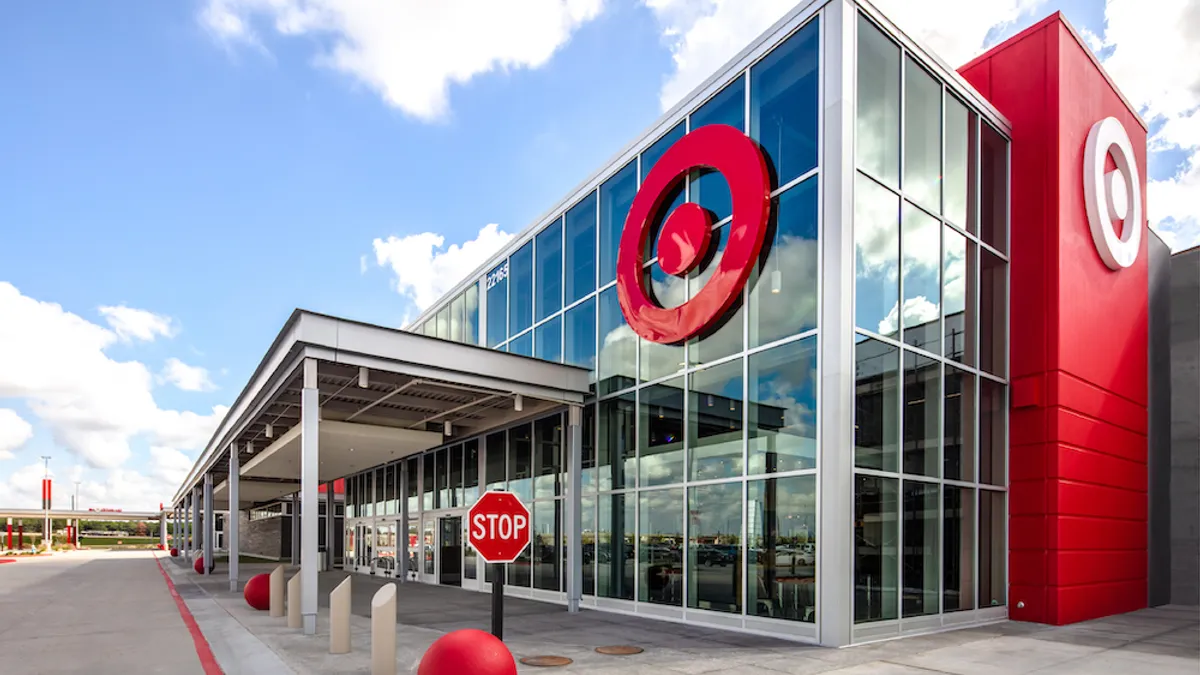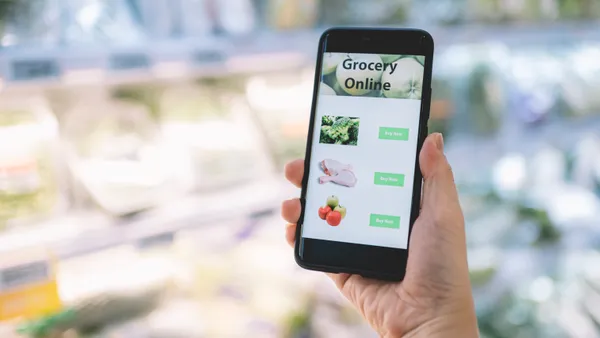Dive Brief:
- Same-day services – which include in-store pickup, drive up and Shipt – increased 4.3% in Q4, making up more than 10% of Target’s sales, the retailer reported on a Tuesday earnings call. Increased customer traffic drove comparable sales up 0.7%. Revenue for the quarter was nearly $31.4 billion.
- Target said its full-year sales increased 2.8% to $107.6 billion from $104.6 billion last year. Full-year total revenue of $109.1 billion was up 2.9% compared with 2021. Comparable sales for the year grew 2.2% on top of 12.7% growth in 2021.
- Target’s 2022 operating income of $3.8 billion was down 57% from $8.9 billion year over year. The retailer said higher freight, and supply chain costs, along with increased compensation and headcount in distribution centers drove its full-year gross margin rate down to 22.7% from 25.7% year over year.
Dive Insight:
Target achieved comparable sales growth in Q4 despite a challenging economic environment. CEO Brian Cornell said strength in food and beverage, beauty and household essentials offset softness in discretionary purchases.
However, the Minneapolis-based retailer's profits continued to slide, with operating income down more than 50%. In the third quarter, while Target posted comp sales growth of 2.7%, operating profit dropped by about half from the same time last year.
During the earnings call, Target executives referenced how unexpectedly difficult the economic environment was in 2022, even compared to the height of the pandemic, and how inflation and supply chain challenges affected retail.
In its first quarter guidance, Target said it expects comp sales to range from a low single-digit decline to a low single-digit increase, and an operating income margin rate of 4% to 5%.
For the near term, Cornell said that the company plans to lean into growth in its nondiscretionary categories, “given [that] value is absolutely top of mind right now.” Christina Hennington, Target’s chief growth officer, echoed that sentiment.
“While our business has been generating growth on top of growth for years now, the mix of last year’s sales looked vastly different than what we had expected,” Hennington said. “Throughout 2022, changing attitudes toward COVID followed by the pressure from persistent inflation caused demand for discretionary categories to slow meaningfully.”
In response, Hennington said, the company is taking a “cautious” approach to this year’s inventory commitments in many categories. Hennington said Target saw “incredible growth” in its food and beverage, and essentials and beauty businesses. That growth offset consumer pullback in discretionary items like home, apparel and hard lines. Despite the pullback, Hennington said Target’s discretionary category still generated $55 billion in sales last year.
Hennington attributed the growth to Target’s customer base, who “are attracted to all things trendy and new. We believe our commitment to newness is a key reason why we continue to generate traffic growth and why we drove broad unit share gains last year.” At the same time, Hennington said a reliable shopping experience is a foundational element of success in retail. To advance that initiative, Hennington said, investments in remodeling and new stores will continue.
Target executives added during the call that the retailer plans to invest significantly during 2023 in its own brands portfolio, including those that are focused on food and beverages. Cornell noted that Target has added 17 brands since 2019 and is “planning a steady cadence of newness in own brands and national brands across our multi-category portfolio in the year ahead.”
Hennington said the company makes a point of avoiding the term “private label” when referring to brands it owns because it believes the term doesn’t accurately reflect its marketing philosophy.
“We build them, design them, create the packaging, the marketing materials, and they're hugely important to our strategy,” Hennington said, referring to Target’s private brands. “And so in that sense, we never think about it as trade-down. We think about as trade-in — it creates more options for people to use and engage with our portfolio because it tends to be the same great quality” at low prices.
Target Chief Operating Officer John Mulligan also announced Tuesday that Target will expand its drive-up offerings that accept returns. Target began accepting returns via drive-up as a pilot program last year. That service “will be available across the chain by the end of the summer,” Mulligan said.
Because Target owns its same-day capabilities, pickup and drive-up are more economical and flexible than other forms of digital fulfillment. As a result, Mulligan said, average fulfillment cost per unit has come down 40% over the past four years.
Sam Silverstein contributed reporting to this story.














